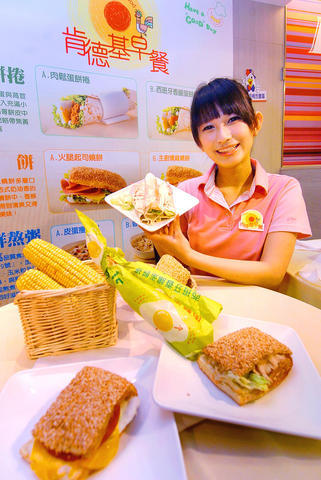Kentucky Fried Chicken (KFC, 肯德雞) Corp began selling rice porridge yesterday at its 70 chain restaurants around Taiwan, following its inclusion of the popular fried bread stick -- youtiao (油條) -- on its breakfast menu in Shanghai in January.
Taiwan KFC's move to introduce a breakfast that is a fusion of Eastern and Western styles came in response to the results of a recent survey that showed a significant preference among people who eat out for a fusion-style breakfast.
The survey, conducted by KFC, showed that 43.67 percent of customers in Taiwan between the ages of 13 and 49 eat out at breakfast time and they usually order hamburgers, sandwiches and Chinese-style pancakes with eggs.

PHOTO: LO PEI-DER, TAIPEI TIMES
The respondents said they would prefer to have more varied and balanced meals at breakfast time.
With this in mind, KFC Taiwan director of marketing Kitty Liu (劉家潾) said the fast food chain developed a breakfast menu that is composed of three different kinds of rice porridge, two kinds of tortilla egg wraps and two kinds of baked wheat rolls -- known locally as shaobing (燒餅) -- with ham and cheese or smoked chicken.
The cost of the KFC set-menu breakfast -- one main selection with a standard cup of coffee or milk tea -- is between NT$55 and NT$68.
KFC's new menu is seen likely to spark a battle for breakfast customers among major fast food chains, including McDonald's, where a similar meal costs between NT$75 and NT$80, and Mos Burger (摩斯漢堡), where customers can obtain a similar breakfast for NT$70 to NT$75.

SEMICONDUCTORS: The firm has already completed one fab, which is to begin mass producing 2-nanomater chips next year, while two others are under construction Taiwan Semiconductor Manufacturing Co (TSMC, 台積電), the world’s largest contract chipmaker, plans to begin construction of its fourth and fifth wafer fabs in Kaohsiung next year, targeting the development of high-end processes. The two facilities — P4 and P5 — are part of TSMC’s production expansion program, which aims to build five fabs in Kaohsiung. TSMC facility division vice president Arthur Chuang (莊子壽) on Thursday said that the five facilities are expected to create 8,000 jobs. To respond to the fast-changing global semiconductor industry and escalating international competition, TSMC said it has to keep growing by expanding its production footprints. The P4 and P5

DOWNFALL: The Singapore-based oil magnate Lim Oon Kuin was accused of hiding US$800 million in losses and leaving 20 banks with substantial liabilities Former tycoon Lim Oon Kuin (林恩強) has been declared bankrupt in Singapore, following the collapse of his oil trading empire. The name of the founder of Hin Leong Trading Pte Ltd (興隆貿易) and his children Lim Huey Ching (林慧清) and Lim Chee Meng (林志朋) were listed as having been issued a bankruptcy order on Dec. 19, the government gazette showed. The younger Lims were directors at the company. Leow Quek Shiong and Seah Roh Lin of BDO Advisory Pte Ltd are the trustees, according to the gazette. At its peak, Hin Leong traded a range of oil products, made lubricants and operated loading

The growing popularity of Chinese sport utility vehicles and pickup trucks has shaken up Mexico’s luxury car market, hitting sales of traditionally dominant brands such as Mercedes-Benz and BMW. Mexicans are increasingly switching from traditionally dominant sedans to Chinese vehicles due to a combination of comfort, technology and price, industry experts say. It is no small feat in a country home to factories of foreign brands such as Audi and BMW, and where until a few years ago imported Chinese cars were stigmatized, as in other parts of the world. The high-end segment of the market registered a sales drop

Citigroup Inc and Bank of America Corp said they are leaving a global climate-banking group, becoming the latest Wall Street lenders to exit the coalition in the past month. In a statement, Citigroup said while it remains committed to achieving net zero emissions, it is exiting the Net-Zero Banking Alliance (NZBA). Bank of America said separately on Tuesday that it is also leaving NZBA, adding that it would continue to work with clients on reducing greenhouse gas emissions. The banks’ departure from NZBA follows Goldman Sachs Group Inc and Wells Fargo & Co. The largest US financial institutions are under increasing pressure